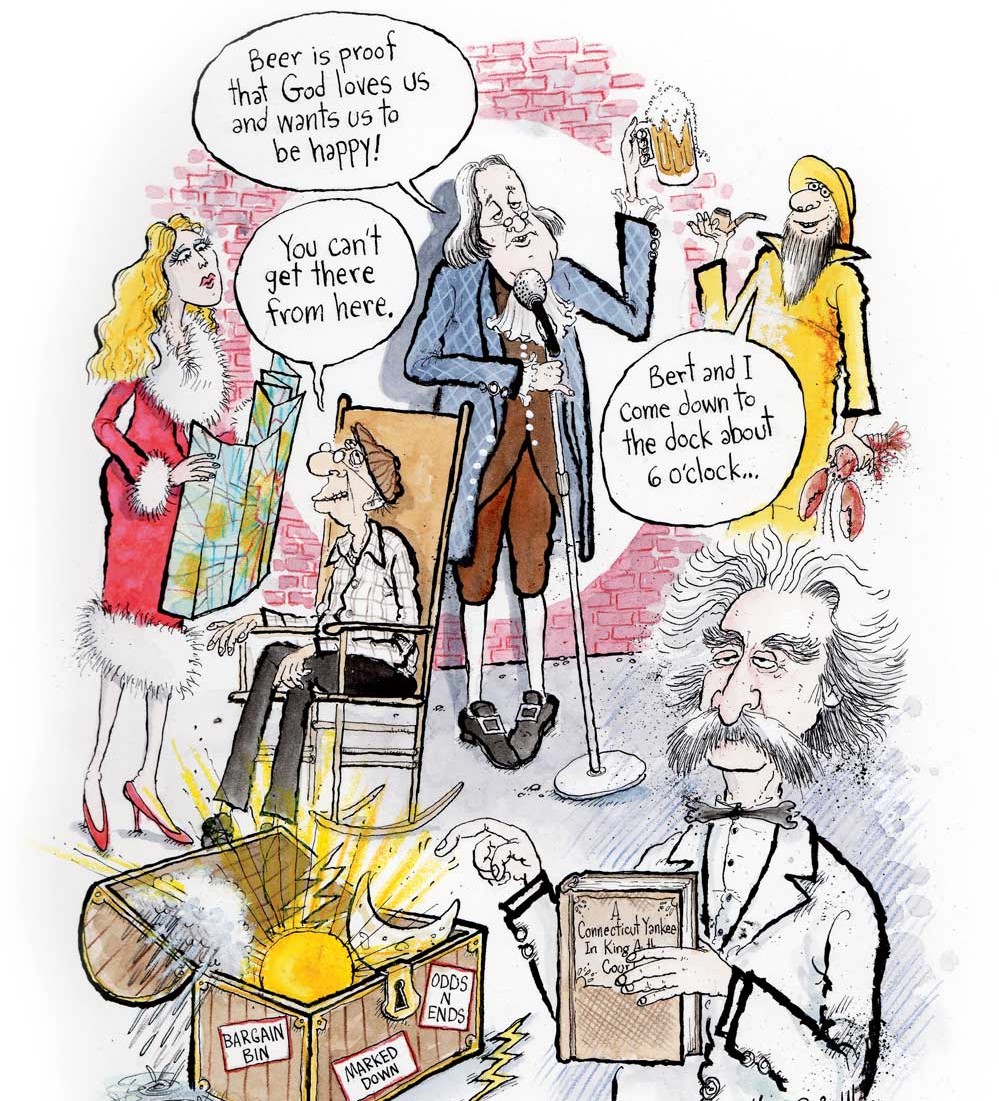History
Yankee Humor | New England’s Gifts
“Humor can be dissected, as a frog can,” E. B. White famously said, “but the thing dies in the process.” Nevertheless, throwing caution to the wind (along with some lint picked off an old sweater), we examine here the contributions made to the field by Yankee humor, which was anaesthetized using extracts of Town Meeting […]

Photo Credit : Mark Brewer
“Humor can be dissected, as a frog can,” E. B. White famously said, “but the thing dies in the process.” Nevertheless, throwing caution to the wind (along with some lint picked off an old sweater), we examine here the contributions made to the field by Yankee humor, which was anaesthetized using extracts of Town Meeting reports prior to the procedure, and which we hope it will survive.

Photo/Art by Mark Brewer
The Taciturn Farmer
The cornerstone of New England humor is the tightlipped Yankee farmer, invariably rocking on his porch or leaning against a fence as he matches wits (or half-wits) with a person from away. This reticent character is so popular, we even sent him to the White House once: Calvin Coolidge, who famously said, when a woman bet she could get him to say more than two words, “You lose.”
The Country Bumpkin
Closely related to the Taciturn Farmer (second cousin on his mother’s side), the Country Bumpkin tells tall tales, usually in a Yankee accent thicker than 40W maple syrup on a winter morning. By a centuries-old agreement among the six New England states, the Bumpkin must be from Maine (or pretend to be). The most notable member of the tribe was Marshall Dodge of Bert and I fame, who, like most bumpkins, was a lot smarter and better educated (Yale) than he let on.
The Rustic Wit
Over the ages, the Rustic Wit has dispensed homespun advice and topical commentary, usually under a pseudo-nym in case victims chafed under the topical ointment. His grandfather was Ben Franklin, who begat the once howlingly funny (and now largely forgotten) Seba Smith, who begat Josh Billings, who begat Titus Moody, and so on. Franklin may also have originated the one-liner in his Poor Richard’s Almanack.
Stealth Humor
Like some medications, Yankee humor is often time-release: It may take some time after hearing a Yankee joke before you actually get the punchline. If this occurs while you’re driving, it’s best to pull over until you regain control. Safety first.
Take the old Mainer who ran a stoplight and broadsided a Cadillac with New York plates. The New Yorker screamed bloody murder until the Mainer pulled out a flask of whiskey and encouraged the other guy to take a swig to calm himself. As the Mainer put the bottle away, the New Yorker said, “Aren’t you going to have some?”
“Nope,” the Mainer said. “I’ll wait till after the police come.”
Stand-Up Guys
Stand-up comedy owes an equal debt to 19th-century lecturers such as Maine-born Artemus Ward, who kept audiences in stitches by wandering onstage as if lost and standing for several minutes in dead silence. Of course, the king of the orators was Mark Twain, who made his home in Connecticut. Twain was at the top of his form when picking on New England’s fickle weather, which he speculated was made by “raw apprentices in the weather-clerk’s factory who experiment and learn how …and then are promoted to make weather for countries that require a good article, and will take their custom elsewhere if they don’t get it.”
Newcomer Narratives
A recurring theme of Yankee humor is the “not from around here” category, based on the belief that anyone not born here is, at best, lacking in the rudiments of common sense. Woe betide those who try to pass, like the fellow who claimed that his children were natives because they were born here and was told, “Just because a cat has kittens in the oven, that don’t make ’em biscuits.”
Worst-Laid Plans
Another oft-repeated motif of Yankee yarns is “The Project,” in which a woefully inept handyman attempts to build or repair some object that anyone with tartar sauce for brains would walk away from. Adding to the drama is the congenital cheapness of the protagonist, ensuring that “The Tale of the Boat” (or outhouse, or sugar shack) will invariably end up a tragedy.
Something in the Water
New England has contributed more than its fair share of mirthmakers to American culture: radio stars like Fred Allen; dynamic duos like Bob and Ray, or Car Talk’s Tom and Ray Magliozzi; Jay Leno, king of the late-night TV hosts; and stalwarts like Tim Sample, keeping the Yankee storytelling flame alive. The heart of Yankee humor, according to Sample, is a calm sense of the way things are, which may go right over the hearer’s head. “It ain’t that it ain’t funny,” Sample says. “You just don’t get it.”

